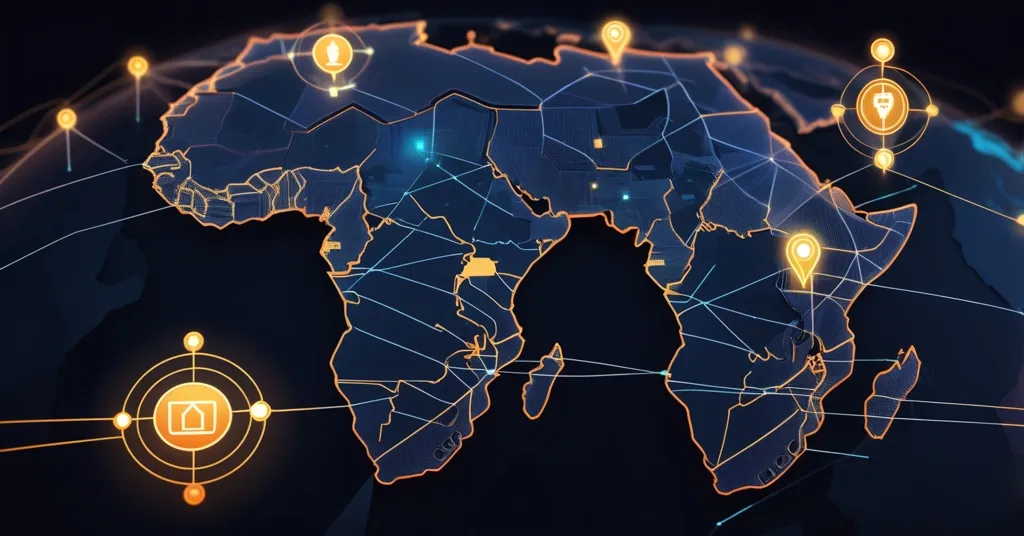Ghana, Rwanda, Singapore Unveil Project 54: Revolutionizing African Cross-Border Payments

Ghana, Rwanda, and Singapore Launch Project 54: A New Era for Cross-Border Payments in Africa
Ghana, Rwanda, and Singapore have teamed up to launch Project 54, a groundbreaking initiative aimed at revolutionizing cross-border payments in Africa. This advanced digital payment system seeks to tackle the continent’s persistent issues of high costs and slow transaction times, promising to usher in a new era of financial efficiency and integration.
- Ghana, Rwanda, Singapore collaboration
- Project 54: Advanced Digital Payment Infrastructure
- Central bank-led with fintech and financial institutions
- Modernizing Africa’s cross-border payment ecosystem
- High costs and slow transactions currently prevalent
- Economic research pivotal for digital payments
Unveiled at the 3i Africa Summit 2025 Policy Forum in Accra, Project 54, or the Next-Gen Digital Payment Infrastructure, is a joint effort between the Bank of Ghana, the National Bank of Rwanda, and Singapore’s fintech network, the Global Financial Technology Network (GFTN). This collaboration is designed to streamline Africa’s cross-border payment ecosystem, which has been hindered by high charges and sluggish transaction times, often made worse by using foreign currencies and complex banking systems.
Johnson Asiama, Governor of the Bank of Ghana, emphasized the system’s potential to enhance interoperability among African financial systems, making money transfers easier and faster. He stated:
“This initiative aims to modernise Africa’s cross-border payment ecosystem through a central bank-led, innovation-enabled approach co-developed with fintechs and financial institutions.”
John Rwangombwa, Governor of Rwanda’s central bank, echoed these sentiments, highlighting the project’s aim to challenge the narrative of high-cost, slow cross-border payments:
“This project is designed to challenge this narrative by creating a system that facilitates instant, low-cost, and secure payments across African borders.”
Rwanda has been leading the charge in digital payment advancements, with Deputy Governor Justin Nsengiyumva underscoring the role of economic research in this progress:
“In this rapidly evolving environment, economic research becomes indispensable. It enables us to deepen our understanding of the drivers behind the transformation in payment systems and their broader economic implications.”
Rwanda’s digital payment transactions have reached an impressive 300% of its GDP, with financial inclusion at 96%. This demonstrates significant strides towards a digital economy, yet challenges such as data protection, cybersecurity, and regulatory frameworks remain crucial areas of focus.
While Project 54 offers a promising solution to Africa’s payment challenges, it’s important to approach it with a balanced perspective. Centralized systems can face hurdles like regulatory compliance, interoperability with existing systems, and potential vulnerabilities to cyber threats. However, the involvement of fintech and financial institutions hints at a promising blend of innovation and governance. As advocates for decentralization and financial freedom, we recognize that while centralized solutions can provide immediate relief, the long-term vision might involve transitioning towards more decentralized technologies like blockchain, which could offer enhanced efficiency, security, and autonomy.
From a bitcoin maximalist standpoint, although Project 54 doesn’t directly leverage bitcoin or blockchain, its goals of reducing costs and increasing transaction speeds resonate with the ethos of cryptocurrencies. Imagine sending money to your family in another country instantly and for a fraction of the cost – that’s the dream of crypto enthusiasts, and Project 54 is a step in that direction. Altcoins and other blockchain technologies could potentially enhance the scalability, security, and efficiency of such systems, filling niches where traditional centralized setups might falter. The future might see these decentralized technologies playing a pivotal role in Africa’s financial revolution.
Project 54 is structured around three key pillars: a trusted identity infrastructure, an interoperable payment system, and a license passporting and data exchange framework. These pillars aim to ensure secure, verifiable, and universal digital identities, standardized real-time cross-border transactions, and strengthened data integrity and financial inclusion. The rollout will focus on a forward-thinking regulatory framework, governance rules for dispute resolution and liability, technology integration exploring tokenization and digital currency use cases, and a pricing model for low-value and high-value transactions.
Africa’s leadership in mobile money, with Sub-Saharan Africa accounting for over two-thirds of global mobile money value and 74% of global transaction volume, illustrates the region’s readiness for digital payment innovations. However, if Project 54 doesn’t revolutionize payments, it’s just another empty promise from the financial world.
Key Takeaways and Questions
- What is Project 54?
Project 54 is an advanced digital payment infrastructure aimed at modernizing cross-border payments in Africa, launched by Ghana, Rwanda, and Singapore.
- Who are the key partners in this initiative?
The key partners are the Bank of Ghana, the National Bank of Rwanda, and Singapore’s fintech network, the Global Financial Technology Network (GFTN).
- How does Project 54 aim to improve current payment systems in Africa?
It aims to reduce high charges and slow transaction times by facilitating instant, low-cost, and secure payments across African borders.
- What is the role of economic research in advancing digital payments in Rwanda?
Economic research is vital for understanding the drivers of payment system transformations and their economic implications, supporting the development of digital payments.
- What challenges does Rwanda face in its digital payment systems?
Challenges include ensuring data protection and privacy, strengthening cybersecurity, achieving seamless interoperability, and designing regulatory frameworks.
- How does this initiative align with the principles of decentralization and bitcoin maximalism?
While Project 54 is a centralized system, it aligns with the principles of reducing costs and increasing transaction speeds, which are core tenets of bitcoin and blockchain technology. It’s a step towards a more efficient financial ecosystem, which could eventually integrate decentralized technologies.
- What role can altcoins and other blockchains play in similar initiatives?
Altcoins and other blockchains could potentially enhance scalability, security, and efficiency in cross-border payment systems, filling niches where centralized systems may fall short.



